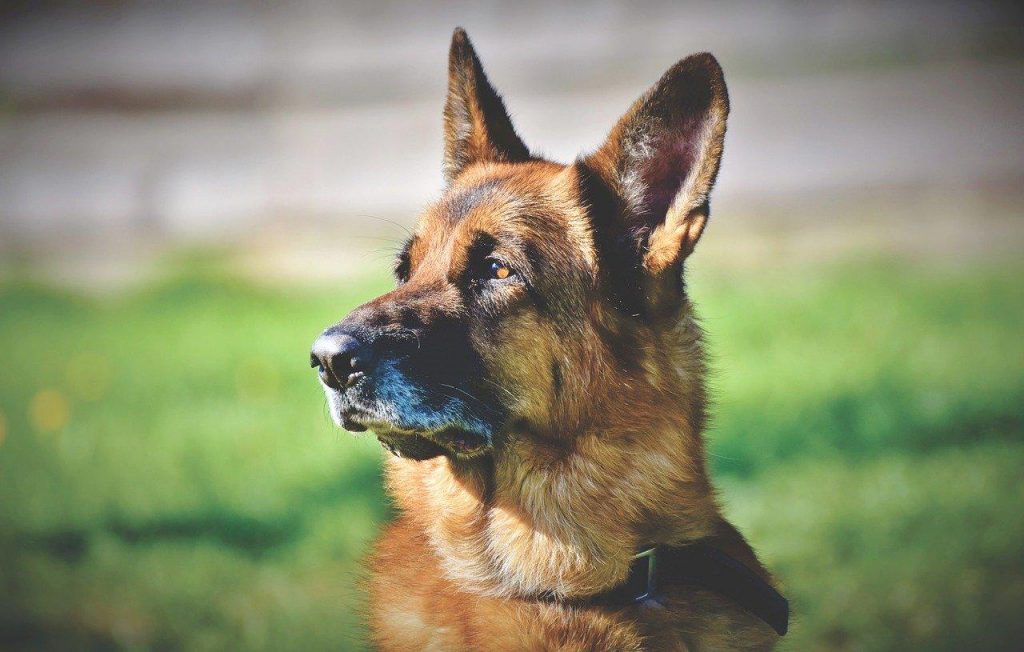What to Look for When Choosing a German Shepherd Puppy
Puppies make our hearts melt, especially when it comes to miniature versions of America’s favorite dog, the German Shepherd. They are about the purest things in the world, and it is really entertaining watching these little guys and girls grow into their big, upright ears – not to mention that they also make exceptional pets once they are adults. So if you’ve decided this breed is for you, and everyone involved agrees, it’s time to roll up your sleeves and find your newest family member. For the best outcome, here’s what to look for when choosing a German Shepherd puppy.


An Overview of Their Temperament
One common hallmark of a well-bred German Shepherd’s temperament is their unwavering loyalty to their owners. And even though they are known for being stoic, this intelligent breed can also be sweet, fun-loving and goofy.
With some companion dogs, it’s a good idea to adopt from your local shelter. The practice helps keep pets surrendered by their owners find loving homes. However, this can be a misguided sentiment when it comes to the German Shepherd breed. In fact, their even temperament comes from a long line of responsible breeding, and a shelter dog may come from a questionable lineage. Ahead, let’s look at what that means when it comes to adopting a German Shepherd puppy or adult.
Adopting from a Shelter Can Be Risky
Adopting a German Shepherd from an animal shelter can be risky for many reasons. For instance, they will often have health problems inherent to the breed that expert breeders will try to minimize through the maintenance of robust bloodlines and selective breeding. Shepherds adopted from animal shelters will often have an unpredictable temperament for that same reason. Living with an under socialized or jittery GSD can be stressful to the entire household – especially since these dogs can get up to 90 pounds!
Instead, you can avoid these pitfalls by looking to a reputable breeder for an adoptable German Shepherd puppy. Responsible and reputable ones breed healthy, emotionally balanced GSDs. This practice improves the breed’s quality and cuts down on the number of them that wind up in shelters with a host of expensive health problems.
Where to Find a Reputable Breeder
First off, a reputable person, non-profit or commercial breeder mainly focuses on preserving and maintaining the breed. Furthermore, adopting a German Shepherd from a resonsible breeder is a big step and a process. It takes a certain amount of time and effort on both the owner and breeder’s part, but the results are undoubtedly worth it.
The fit between you and your dog needs to be excellent all around, and a breeder with a good ‘pedigree’ will have the expertise and skills to match the best pup to your purpose for adopting. Meanwhile, German Shepherds have unique needs so here are some important factors to consider when searching for a reputable breeder:
- Health Testing – German Shepherds are prone to health issues such as hip & elbow dysplasia, and responsible breeders will test for these health conditions. Breeders that go above and beyond will test for more health problems than is recommended by the American Kennel Club (AKC).
The ideal breeder you want to work with to adopt your German Shepherd puppy will be upfront about any health problems inherent in the bloodline. They will also have their vaccination records available.
- Parents on Premises – To determine what kind of adult dog your cute puppy will grow up to be, it’s an excellent idea to meet their parents or pups from other litters. If possible, try to meet their grandparents.
While most breeders have at least the mother on the premises, they should, at the very least, demonstrate a sound temperament in both parents and their previous litters. Some will feature stories about where the puppies from previous litters have ended up and offer testimonials about owners’ experiences with their dogs on their websites.
- Appearance Matters – Do the looks of your dog matter? Well, the answer to that question is yes and no. When it comes to aesthetics, a dog’s appearance might catch a particular owner’s discerning eye more than their other littermates. That aspect is a matter of preference, but it’s not what is actually the most important.
German Shepherds come in a variety of coat colors and lengths, but don’t let a desire for a pooch’s particular coloring, hair length, etc., be the only factor you look for in a dog and from a breeder. If you do, you sell both you and these magnificent animals short. On the other hand, some aspects of appearance do matter, which we will discuss in the section about how to pick out a puppy from a litter.
- Recommendations – Ask around your community for information about GSD breeders in the Chicago area. Your vet, dog groomer or local humane society might know of a good breeder in the area too. They can also recommend against breeders that regularly produce emotionally unstable or unhealthy German Shepherds.
You can also check out online reviews and social media to find Chicago German Shepherd breeders with good reputations.
Warning Signs of a Disreputable Breeder
There is a lot of love, care and hard work that goes into breeding world-class German Shepherd puppies. Unfortunately, some breeders are not up to snuff in this regard.
Warning signs to look out for include signs up at a farm that seems to always have plenty of pups up for sale. There is nothing wrong with German Shepherd dogs being bred on farms, which is where we breed our dogs. However, this is where similarities end between us and farms that produce many puppies without regard to their comfort and lineage.
What’s worse is that these farms can be puppy mills in disguise. If you are unfamiliar with the unethical and heartbreaking practice of puppy mill farming, then you are lucky. What you need to know, though, is that a puppy mill is a commercial dog breeding facility that is often characterized by quick breeding and poor conditions. Often, no more love and care is put into these animals than is put into livestock and crops, and animals there usually lead miserable existences. Also, be aware that puppies at some flea markets and pet stores come from puppy mills.
Supporting irresponsible breeders perpetuates health problems GSDs face, and if you come across a breeder whose main selling point is that they sell their puppies for less than the other guy, then you should run.
How to Pick Out a Puppy from a Litter
It can be difficult to choose the best dog from a litter of eager pups with wiggly butts, but you must put a lot of thought into which one is best for you. If it’s possible, also visit the breeder’s facility. The kennel they are kept in should be clean, and all of the litter should appear active and healthy – with documented proof that confirms they are as well. Puppies that appear dirty, weak or skinny are major red flags that indicate that the breeder is not taking proper care of them.
Once you are matched with a reputable breeder and contact them, they will listen to your purpose in owning a new dog and match you with a bloodline of puppies to choose from. If you are familiar with German Shepherd K-9s or seen one that is a Seeing Eye dog, you may be surprised to know that different bloodlines of this working breed are more suited to their owners’ different purposes. In light of that, the breeder will consider what you want to achieve from your potential companion after a discussion with you. They will then work hard to match you with a puppy from the bloodline that is best suited to you.
Things to Tell the Breeder
As you can clearly tell by reading, a German Shepherd dog is not a one-size-fits-all breed. And part of owning your new pet is knowing with certainty what qualities you want in them before you contact the breeder. Here are a few things to let the breeder know when you talk to them:
- What sex you want your pup to be.
- That you are interested in showing your dog in competitions.
- You want to breed your GSD later.
- You have small children or other animals.
- You want your GSD to be a service animal.
Information such as this can help the breeder select a German Shepherd puppy from a bloodline they believe will be a good fit for you. For instance, if you are interested in a dog that is a companion to the entire family, they may recommend a pup from the West German bloodline since they make such amazing family companion dogs. Also known as “protection you can hug,” they are also used regularly as therapy and service dogs.
On the other hand, if you are someone from an organization that needs an excellent police dog, East German Shepherds pups are the ones the breeder will most likely recommend as the dog for you. These K-9s are bred to have high energy and be aggressive. With these characteristics, these GSDs maintain incredible focus on the tasks assigned to them by their handlers. As you can probably tell, the coiled wire energy of this dog breed needs to be unleashed, and its bountiful energy and aggression probably wouldn’t be appreciated in a family setting.
What to Expect
If you’ve decided to forge ahead and get your new German Shepherd puppy, you can expect it to be thoroughly socialized with the breeder (for about X weeks), and with you, the owner, for about (X weeks). After that, it’s an ongoing process.
Regis Regal: A Breeder of Merit
If you are looking for a reputable breeder, the AKC named Regis Regal a Breeder of Merit. Additionally, we breed world-class West-German sieger puppies to be companions and protectors of families, as well as therapy and service canines. We are based in Spring Grove, Illinois and serve the surrounding area.
If you’re not based locally, we offer a private courier service where we can deliver your German Shepherd pup to your home. We like to go the extra mile when it comes to delivering the perfect German Shepherd puppy to your door, and we will take the utmost love and care of your little fella during the journey. Please contact us online or call us at 847-721-1908 if you are interested in any of our upcoming litters.
